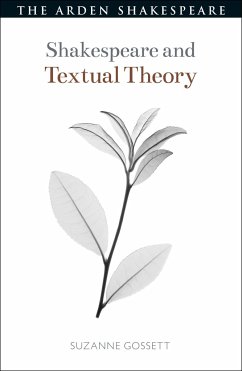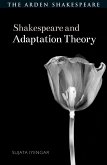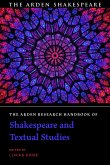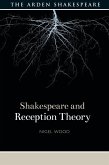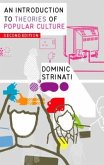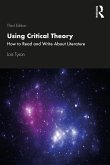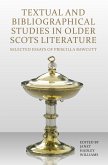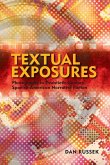Prof. Suzanne Gossett (USA Loyola University Chicago)
Shakespeare and Textual Theory
Prof. Suzanne Gossett (USA Loyola University Chicago)
Shakespeare and Textual Theory
- Broschiertes Buch
- Merkliste
- Auf die Merkliste
- Bewerten Bewerten
- Teilen
- Produkt teilen
- Produkterinnerung
- Produkterinnerung
An essential resource for the history of Shakespeare on the page, this book traces the historical intersection of textual theory and Shakespeare studies and analyzes current theoretical debates in the field.
Andere Kunden interessierten sich auch für
![Shakespeare and Adaptation Theory Shakespeare and Adaptation Theory]() Sujata Iyengar (USA University of Georgia)Shakespeare and Adaptation Theory35,99 €
Sujata Iyengar (USA University of Georgia)Shakespeare and Adaptation Theory35,99 €![The Arden Research Handbook of Shakespeare and Textual Studies The Arden Research Handbook of Shakespeare and Textual Studies]() The Arden Research Handbook of Shakespeare and Textual Studies47,99 €
The Arden Research Handbook of Shakespeare and Textual Studies47,99 €![Shakespeare and Reception Theory Shakespeare and Reception Theory]() Nigel Wood (UK Loughborough University)Shakespeare and Reception Theory40,99 €
Nigel Wood (UK Loughborough University)Shakespeare and Reception Theory40,99 €![An Introduction to Theories of Popular Culture An Introduction to Theories of Popular Culture]() Dominic StrinatiAn Introduction to Theories of Popular Culture56,99 €
Dominic StrinatiAn Introduction to Theories of Popular Culture56,99 €![Using Critical Theory Using Critical Theory]() Lois TysonUsing Critical Theory41,99 €
Lois TysonUsing Critical Theory41,99 €![Textual and Bibliographical Studies in Older Scots Literature Textual and Bibliographical Studies in Older Scots Literature]() Janet Hadley WilliamsTextual and Bibliographical Studies in Older Scots Literature37,99 €
Janet Hadley WilliamsTextual and Bibliographical Studies in Older Scots Literature37,99 €![Textual Exposures Textual Exposures]() Dan RussekTextual Exposures33,99 €
Dan RussekTextual Exposures33,99 €-
-
-
An essential resource for the history of Shakespeare on the page, this book traces the historical intersection of textual theory and Shakespeare studies and analyzes current theoretical debates in the field.
Produktdetails
- Produktdetails
- Shakespeare and Theory
- Verlag: Bloomsbury Publishing PLC
- Seitenzahl: 272
- Erscheinungstermin: 10. Februar 2022
- Englisch
- Abmessung: 130mm x 197mm x 18mm
- Gewicht: 298g
- ISBN-13: 9781350121232
- ISBN-10: 1350121231
- Artikelnr.: 61963341
- Herstellerkennzeichnung
- Libri GmbH
- Europaallee 1
- 36244 Bad Hersfeld
- gpsr@libri.de
- Shakespeare and Theory
- Verlag: Bloomsbury Publishing PLC
- Seitenzahl: 272
- Erscheinungstermin: 10. Februar 2022
- Englisch
- Abmessung: 130mm x 197mm x 18mm
- Gewicht: 298g
- ISBN-13: 9781350121232
- ISBN-10: 1350121231
- Artikelnr.: 61963341
- Herstellerkennzeichnung
- Libri GmbH
- Europaallee 1
- 36244 Bad Hersfeld
- gpsr@libri.de
Suzanne Gossett
Series Editor's Preface
Acknowledgements
Introduction
Part One: Textual Studies Before 'Theory'
1 Shakespeare's Texts From the Sixteenth to the
Nineteenth Century
The progress of an early modern play
The First Folio
Successive Folios
Early editions
Part Two: Twentieth-Century Theories
2 The New Bibliography
3 The Advent of Poststructuralism
4 Textual and Other Theories
Part Three: Current Debates
5 Authorship, Agency, and Intentionality
6 Attribution and Collaboration
External evidence
Internal evidence
Enlarging the canon
Theoretical implications
7 The (In)Stability of the Text
What if the printer went to lunch?
Why are some texts bad?
Why - and how and when - do some texts change?
8 Editing and Unediting
Editing Shakespeare
Editing collaborations
Unediting Shakespeare
Deciding on intervention
9 Book History and the Text
Shakespeare as literary dramatist
The creation of 'Shakespeare' through books
Readers, commonplacers and collectors
Women and Shakespeare books
Two material texts
10 Performance and the Text
Traces of early performance
Editing for performance
11 Textual Theories and Difficult Cases: Hamlet
and Pericles
Shakespeare's texts and early editions
Enter the New Bibliography
The challenge of post-structuralism, or authorship,
authority, and intention
Textual and other theories
Attribution and collaboration
Printing unstable texts
Editing and unediting
Book history and the text
Performance and the text
Coda: The Immaterial Text
12 Textual Studies After the Digital Turn
References
Index
Acknowledgements
Introduction
Part One: Textual Studies Before 'Theory'
1 Shakespeare's Texts From the Sixteenth to the
Nineteenth Century
The progress of an early modern play
The First Folio
Successive Folios
Early editions
Part Two: Twentieth-Century Theories
2 The New Bibliography
3 The Advent of Poststructuralism
4 Textual and Other Theories
Part Three: Current Debates
5 Authorship, Agency, and Intentionality
6 Attribution and Collaboration
External evidence
Internal evidence
Enlarging the canon
Theoretical implications
7 The (In)Stability of the Text
What if the printer went to lunch?
Why are some texts bad?
Why - and how and when - do some texts change?
8 Editing and Unediting
Editing Shakespeare
Editing collaborations
Unediting Shakespeare
Deciding on intervention
9 Book History and the Text
Shakespeare as literary dramatist
The creation of 'Shakespeare' through books
Readers, commonplacers and collectors
Women and Shakespeare books
Two material texts
10 Performance and the Text
Traces of early performance
Editing for performance
11 Textual Theories and Difficult Cases: Hamlet
and Pericles
Shakespeare's texts and early editions
Enter the New Bibliography
The challenge of post-structuralism, or authorship,
authority, and intention
Textual and other theories
Attribution and collaboration
Printing unstable texts
Editing and unediting
Book history and the text
Performance and the text
Coda: The Immaterial Text
12 Textual Studies After the Digital Turn
References
Index
Series Editor's Preface
Acknowledgements
Introduction
Part One: Textual Studies Before 'Theory'
1 Shakespeare's Texts From the Sixteenth to the
Nineteenth Century
The progress of an early modern play
The First Folio
Successive Folios
Early editions
Part Two: Twentieth-Century Theories
2 The New Bibliography
3 The Advent of Poststructuralism
4 Textual and Other Theories
Part Three: Current Debates
5 Authorship, Agency, and Intentionality
6 Attribution and Collaboration
External evidence
Internal evidence
Enlarging the canon
Theoretical implications
7 The (In)Stability of the Text
What if the printer went to lunch?
Why are some texts bad?
Why - and how and when - do some texts change?
8 Editing and Unediting
Editing Shakespeare
Editing collaborations
Unediting Shakespeare
Deciding on intervention
9 Book History and the Text
Shakespeare as literary dramatist
The creation of 'Shakespeare' through books
Readers, commonplacers and collectors
Women and Shakespeare books
Two material texts
10 Performance and the Text
Traces of early performance
Editing for performance
11 Textual Theories and Difficult Cases: Hamlet
and Pericles
Shakespeare's texts and early editions
Enter the New Bibliography
The challenge of post-structuralism, or authorship,
authority, and intention
Textual and other theories
Attribution and collaboration
Printing unstable texts
Editing and unediting
Book history and the text
Performance and the text
Coda: The Immaterial Text
12 Textual Studies After the Digital Turn
References
Index
Acknowledgements
Introduction
Part One: Textual Studies Before 'Theory'
1 Shakespeare's Texts From the Sixteenth to the
Nineteenth Century
The progress of an early modern play
The First Folio
Successive Folios
Early editions
Part Two: Twentieth-Century Theories
2 The New Bibliography
3 The Advent of Poststructuralism
4 Textual and Other Theories
Part Three: Current Debates
5 Authorship, Agency, and Intentionality
6 Attribution and Collaboration
External evidence
Internal evidence
Enlarging the canon
Theoretical implications
7 The (In)Stability of the Text
What if the printer went to lunch?
Why are some texts bad?
Why - and how and when - do some texts change?
8 Editing and Unediting
Editing Shakespeare
Editing collaborations
Unediting Shakespeare
Deciding on intervention
9 Book History and the Text
Shakespeare as literary dramatist
The creation of 'Shakespeare' through books
Readers, commonplacers and collectors
Women and Shakespeare books
Two material texts
10 Performance and the Text
Traces of early performance
Editing for performance
11 Textual Theories and Difficult Cases: Hamlet
and Pericles
Shakespeare's texts and early editions
Enter the New Bibliography
The challenge of post-structuralism, or authorship,
authority, and intention
Textual and other theories
Attribution and collaboration
Printing unstable texts
Editing and unediting
Book history and the text
Performance and the text
Coda: The Immaterial Text
12 Textual Studies After the Digital Turn
References
Index

